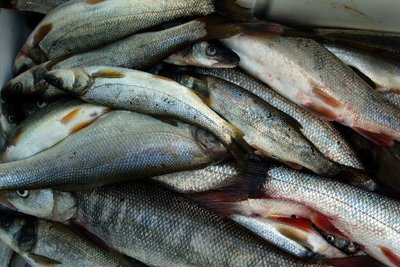forum
library
tutorial
contact

BPA Program: Northern Pikeminnow Effort
Reduces Salmon Predation
by Jeffrey P. Mayor
The Olympian, April 29, 2012
|
the film forum library tutorial contact |

|
BPA Program: Northern Pikeminnow Effort
by Jeffrey P. Mayor
|
 The chance to get paid for the fish you catch returns Tuesday. That is when the Pikeminnow Sport Reward Fishery Program reopens for the season.
The chance to get paid for the fish you catch returns Tuesday. That is when the Pikeminnow Sport Reward Fishery Program reopens for the season.
Funded by the Bonneville Power Administration, the program is meant to remove the voracious pikeminnows from the lower Columbia River and the Snake River so they don't eat too many juvenile salmon.
Anglers are paid for each fish 9 inches or longer that they catch during the season, which runs through Sept. 30. Payments run from $4-$8 per fish, depending on how many you catch during the season. Specially tagged fish are worth $500 each.
Northern pikeminnow eat millions of salmon and steelhead juveniles each year in both rivers. The goal of the program is not to eliminate pikeminnows, but reduce the average size and curtail the number of larger, older fish. Reducing the number can greatly help the salmon and steelhead juveniles making it out to sea.
Since 1990, more than 3.9 million northern pikeminnow have been removed by people taking part in the program. Fishery managers estimate predation on juvenile salmonids was cut by 35 percent last year.
In 2011, the pikeminnow reward fishery paid $978,678 for 153,999 non-tagged fish and $77,500 for 155 tagged fish, said Craig Miller of the Pacific States Marine Fisheries Commission.
That is down from 2010, when the program paid $1,117,994 for 173,768 untagged fish and $106,500 for 213 tagged fish.
The program pays for fish caught in the lower Columbia, from the river mouth to Priest Rapids Dam, and in the Snake, from the mouth to Hells Canyon Dam.
To take part in the program, anglers must register in person at one of the designated stations each day before fishing. Anglers may register when stations are unstaffed by using the self-registration box. To obtain a payment voucher, an angler must return with the fish alive or in fresh condition to the same registration station. The fish must be returned on the same calendar day stamped on the angler's registration form, before that station closes for the day, and they must have been caught subsequent to that days' registration time, according to program rules.
THE NORTHERN PIKEMINNOW
Scientific name: Ptychocheilus oregonensis
What is it: The northern pikeminnow is a large member of the minnow family native to the Pacific slope of western North America. Formerly known as "northern squawfish", the name was changed to northern pikeminnow by the American Fisheries Society in 1998.
Description: The fish has a long snout with a large mouth extending back to the eye. The body is dark green or dusky green above and silvery or creamy white below, with clear fins. Northern pikeminnow are similar in shape to the non-native walleye, but lacks the walleye's obvious teeth and spiny fin rays. Females each sexual maturity at about six years, males in three-five. They can live longer than 15 years, reaching over 24 inches and eight pounds.
Correct identification: The northern pikeminnow of the Columbia can be mistaken for a peamouth. The peamouth has a rounded head and the corner of the mouth stops will before the eye.
SLIDING PAY SCALE
The 2012 payment schedule, based on the total fish caught for the season, is as follows:
0-100 fish: $4 per fish
101-400 fish: $5 per fish
401 and above: $8 per fish
Tagged fish rewards: $500 per tagged fish
Information: 800-858-9015 or pikeminnow.org
learn more on topics covered in the film
see the video
read the script
learn the songs
discussion forum
